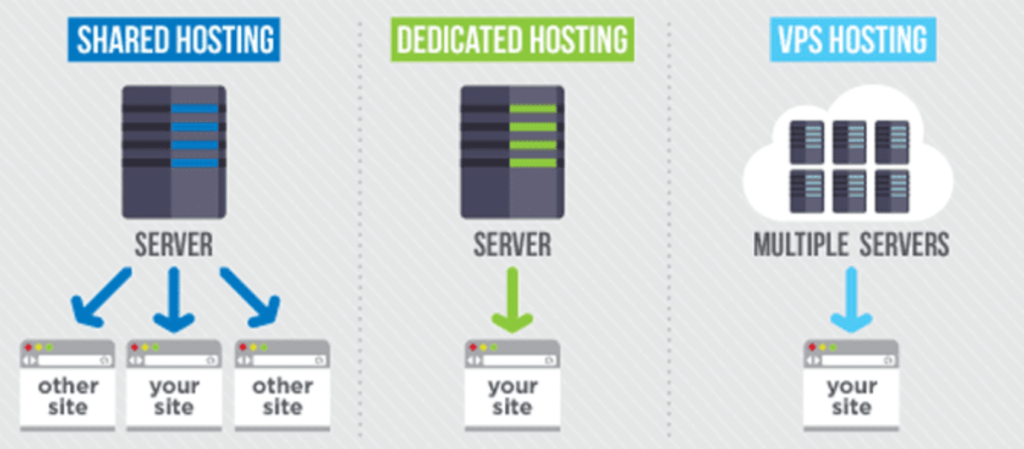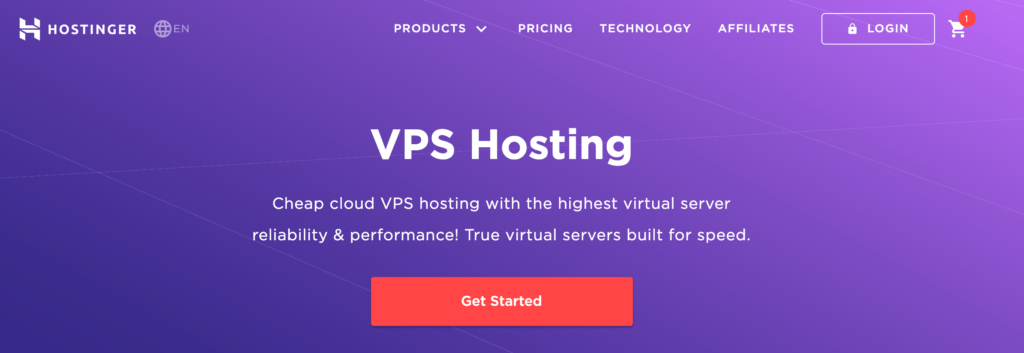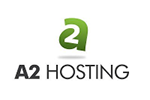Want to jump straight to the answer? The best VPS host for most people is definitely Bluehost or Hostinger.
Virtual private server (VPS) hosting is a step up from a shared hosting service. While shared hosting is cost-effective for beginner websites, it’s not the best solution when your traffic and business grows.
As your site scales, its hosting needs are going to change. That’s when it’s time to start looking for VPS hosting.
Not sure whether VPS hosting makes sense for your business? Jump further down this post for more on how VPS works and how it compares to other hosting options.
Finding the best VPS hosting plan can be intimidating. There are so many hosting providers out there offering VPS options. Taking the time to research all of them would take days.
Fortunately for you, I’ve already taken the time to do all of the research. I’ve gone through dozens of VPS hosting plans and narrowed down the top options for you to consider.
Here are my 9 top picks for the best virtual private server providers in 2021.
Top 9 best VPS hosting providers:
- Bluehost – Best for power and flexibility at a reasonable price
- Hostinger — Most bang for your buck
- InMotion – Best cloud VPS plans
- A2 Hosting – Best low-cost unmanaged plans for developers
- HostGator – Best for locking in low introductory pricing rates
- iPage – Best cheap VPS plans
- LiquidWeb – Best fully managed VPS with high memory and storage plans
- HostPapa – Best enterprise-level VPS plans
- Kamatera — Best VPS hosting for scaling
Read on for detailed reviews of the VPS hosts above. I highlighted their plans and pricing while explaining what makes each one a good VPS hosting option. You’ll also learn about some of the potential downsides or weaknesses of these providers as well. Let’s begin.
Virtual Private Server Reviews
Bluehost VPS – Best VPS for power and flexibility
- Normally $29.99/month
- Free domain and SSL certificate
- Free SSD for extreme speed
- 30-day money back guarantee
Bluehost is an industry leader in the web hosting space. Their VPS plans offer a wide range of hosting options, to accommodate the needs of nearly every website.
The reason why Bluehost stands out as a top choice to consider is because their virtual private servers offer both power and flexibility. They allow multi-server management, meaning you can add more space to your plan at any given time.
This is ideal for websites that need the ability to scale at a moment’s notice, without any delays or downtime. You’ll be able to accomplish this without any assistance from a Bluehost administrator, directly from your advanced cPanel.
Here’s an overview of Bluehost’s plans and pricing:
Standard VPS
- Starting at $19.99 per month
- 2 CPU cores
- 30 GB of SSD
- 2 GB of RAM
- 1 TB of bandwidth
Enhanced VPS
- Starting at $29.99 per month
- 2 CPU cores
- 60 GB of SSD
- 4 GB of RAM
- 2 TB of bandwidth
Premium VPS
- Starting at $49.99 per month
- 3 CPU cores
- 90 GB of SSD
- 6 GB of RAM
- 2 TB of bandwidth
Ultimate VPS
- Starting at $59.99 per month
- 4 CPU cores
- 120 GB of SSD
- 8 GB of RAM
- 3 TB of bandwidth
As you can see, Bluehost offers pricing and resources for websites of all shapes and sizes.
I found in my complete review of BlueHost hosting that even if you’re looking for an entry-level VPS plan, I’d still recommend starting with the Enhanced VPS as opposed to the Standard. For just $10 more per month, you’ll get double the SSD, RAM, and bandwidth.
Although it’s worth noting that the prices listed above are promotional rates only. You’ll end up paying $29.99, $59.99, $89.99, and $119.99, respectively, when your plan renews.
All Bluehost virtual private server plans include 24/7 support and a 30-day money-back guarantee. For a fair price, you’ll benefit from plenty of resources, support, and uptime compared to other options on the market.
Hostinger – Most bang for your buck
- Normally $7.99/month
- Month-to-month pricing
- Free domain and SSL certificate
- 30-day money back guarantee
Hostinger gives you a stellar VPS at rock bottom prices.
They don’t offer dedicated servers. That means their VPS hosting plans deliver the most performance and speed.
Their VPS options are as follows:
1 vCPU
- $3.95 / month
- 1 core
- 1 GB RAM
- 20 GB SSD Storage
- 1 TB Bandwidth
2 vCPU
- $8.95/month
- 2 Cores
- 2 GB RAM
- 40 GB SSD Storage
- 2 TB Bandwidth
3 vCPU
- $12.95/month
- 3 Cores
- 3 GB RAM
- 60 GB SSD Storage
- 3 TB Bandwidth
4 vCPU
- $15.95/month
- 4 Cores
- 4 GB RAM
- 80 GB SSD Storage
- 4 TB Bandwidth
6 vCPU
- $23.95/month
- 6 Cores
- 6 GB RAM
- 120 GB SSD Storage
- 6 TB Bandwidth
8 vCPU
- $29.95/month
- 8 Cores
- 8 GB RAM
- 160 GB SSD Storage
- 8 TB Bandwidth
As you can see, there’s a wide variety of choices you can make when it comes to Hostinger’s VPS hosting. Couple that with its low prices and great features, and you know this is the VPS host that gives you the most bang for your buck.
Personally, I’d go with the 6 vCPU plan. That gives you all the bandwidth you’d need along with the RAM to make sure your website is running smoothly—and quickly too.
Overall, I highly suggest it for anyone looking to get the most out of their dollar.
InMotion VPS – Best cloud VPS plans
- Normally $64.99/month
- Free domain and SSL certificate
- Free and unlimited email
- 90-day money back guarantee
Unlike other web hosting providers that are best-known for shared hosting or dedicated servers, InMotion specializes in VPS hosting.
It doesn’t matter if you’re upgrading from an existing plan or looking to host a brand new website. InMotion offers great VPS hosting at a great price.
I like that InMotion offers traditional VPS hosting as well as Cloud VPS hosting. Altogether, they have six VPS plans (three for each category).
Let’s take a look at each one to see what’s best for your website.
InMotion Managed VPS Hosting
The managed plans are ideal for business owners, agencies, and resellers. Each plan offers free server management, updates, and free site migrations.
You’ll also benefit from a resource monitoring dashboard, unlimited domains, unlimited email accounts, and unlimited MySQL databases.
- VPS-1000HA-S — Starting at $22.99 per month
- VPS-2000HA-S — Starting at $34.99 per month
- VPS-3000HA-S — Starting at $54.99 per month
To get these low introductory rates, you’ll need to sign up for a 2-year plan.
All plans are ecommerce-optimized and come with optional root access for those of you who want more advanced control over your settings.
InMotion Cloud VPS
The cloud hosting account plans offered by InMotion are best for developers and system administrators. That’s because each plan comes with full root access, including SSH keys, which gives you total control over customization.
As a developer, you’ll essentially get a blank-slate to customize a VPS to meet the exact needs of your website. You can also code in the language of your preference, like Java, Ruby, and other popular choices.
InMotion Cloud VPS provides enterprise-level hardware, with SSD servers that are 20x faster than the competition.
- cVPS-1 — Starting at $5 per month
- cVPS-2 — Starting at $10 per month
- cVPS-3 — Starting at $15 per month
- cVPS-4 — Starting at $20 per month
- cVPS-6 — Starting at $30 per month
- cVPS-8 — Starting at $50 per month
- cVPS-16 — Starting at $80 per month
- cVPS-32 — Starting at $160 per month
In my review of InMotion hosting I found that in order to get the best introductory rates for cloud VPS, you need to commit for one year, as opposed to two years with the managed plans.
Prices for managed plans and cloud hosting plans are a lot alike. The biggest difference between the two is basically how much control you want over the server.
Unless you’re a developer, I think that the majority of you should lean toward the managed plans, just based on simplicity.
A2 Hosting VPS – Best low-cost unmanaged plans for developers
- Managed starts at $49.99/month
- Unmanaged starting at $5/month
- Free SSD with root access
- 30-day money back guarantee
A2 Hosting offers some of the fastest hosting out there. They especially stand out because they offer both managed and unmanaged VPS plans.
Typically, unmanaged VPS plans with root access and custom features come at a higher price point. But not with A2 Hosting.
Experienced developers can get an unmanaged virtual private server for as low as $5 per month. Although with just 20 GB of storage and 512 MB of RAM, this entry-level plan likely won’t meet your needs.
Here’s a closer look at A2’s VPS plans:
Unmanaged VPS Plans
- Entry — Starting at $5 per month
- Mid — Starting at $10 per month
- Elite — Starting at $15 per month
With the unmanaged plans, you can configure your server preferences for disk space, CPU, memory, and bandwidth. Obviously, any adjustments will impact the price.
Managed VPS Plans and Core VPS Plans
- Power — Starting at $25 per month
- Prestige — Starting at $35 per month
- Pinnacle — Starting at $50 per month
The only difference between the Managed plans and Core plans is that the core plans come with root access. However, you won’t be able to configure your server the same way you would if you select an unmanaged plan.
Overall, A2 is a great choice for developers who want complete control and customization over their VPS at an affordable rate. For traditional managed hosting, I’d probably look elsewhere.
With that said, A2 Hosting has one of the best customer support teams on the market. So if that’s something that you prioritize, it’s worth taking a closer look at their plans. Check out my full review of A2 hosting for more about the company.
HostGator VPS – Best VPS for low introductory pricing rates
- Normally $89.95/month
- Flexible Software Options
- Advanced Server Features
- 45-day money back guarantee
HostGator is another popular name in the world of web hosting. Their VPS plans are top notch for their excellent pricing plans.
Although their plans aren’t the lowest that we’ve seen, they’re still pretty good. Their VPS plans are geared towards more professional, experienced web managers though. So if you want more control over technical aspects of your website, this is the host for you.
Snappy 2000
- Starting at $29.95 per month
- 2 GB of RAM
- 2 CPU cores
- 120 GB of disk space
- 1.5 TB of bandwidth
Snappy 4000
- Starting at $39.95 per month
- 4 GB of RAM
- 2 CPU cores
- 165 GB of disk space
- 2 TB of bandwidth
Snappy 8000
- Starting at $49.95 per month
- 8 GB of RAM
- 4 CPU cores
- 240 GB of disk space
- 3 TB of bandwidth
The prices are fair for the resources. But like most hosting providers, these introductory rates will increase when your plan renews.
However, HostGator gives you the option to lock in these low rates for the longest time compared to other options we’ve seen so far. You can pay these intro rates for 36 months.
But with that said, the price increases are the most significant compared to other providers as well. The introductory rates are all roughly 75% cheaper than the actual rates.
HostGator stands out with its reliable and multi-layer security network. This enhanced protection paired with the ability to easily scale your resources is what makes HostGator a top VPS choice on our list.
They also offer good cloud hosting plans as I found in my review of HostGator cloud hosting. Just keep in mind that their customer service and support falls a bit short compared to other providers.
iPage VPS – Best cheap VPS plans
- Normally $24.99/month
- Free domain and SSL certificate
- Free drag and drop site builder
- 30-day money back guarantee
If you’re looking for a low-cost VPS plan, look no further than iPage. With plans starting as low as $19.99 per month, iPage offers a quality service at an affordable rate.
iPage has been around for more than 20 years. Over 1 million sites are using this platform for web hosting. So if you decide to go with one of their VPS plans, you know that you’re getting it from a reputable provider.
Let’s take a closer look at their plans.
Basic VPS
- Starting at $19.99 per month (renews at $24.99)
- 1 CPU core
- 1 GB of RAM
- 40 GB of disk space
- 1 TB of bandwidth
Business VPS
- Starting at $47.99 per month (renews at $59.49)
- 2 CPU cores
- 4 GB of RAM
- 90 GB of disk space
- 3 TB of bandwidth
Optimum VPS
- Starting at $79.99 per month (renews at $99.99)
- 4 CPU cores
- 8 GB of RAM
- 120 GB of disk space
- 4 TB of bandwidth
As you can see, these are the lowest prices that we’ve seen so far, even after the full-price renewal rates kick in.
iPage also specializes in web design and other services that I discovered in my in-depth review of iPage hosting. So for those of you who are building a new website from scratch and want to start with a cheap VPS hosting plan, iPage is a top choice.
Even with these low rates, you’ll still benefit from quality 24/7 support. You just won’t get the capacity and resources offered by some higher-tier providers.
LiquidWeb VPS – Best fully managed VPS with high memory and storage plans
- Normally $59.99/month
- Fully managed services
- Enhanced SSD servers
- 59 second support guarantee
LiquidWeb is one of the most understated VPS hosting services out there. Though they’re not very well-known, they offer excellent hosting solutions.
All LiquidWeb VPS plans are fully managed. They manage your hardware and the network. Their administrators also handle all security updates and patches as well as support for the operating system and all software.
Unlike some of the other hosting providers we’ve seen so far, LiquidWeb doesn’t have any special or fancy names for their plans. You’re essentially paying for your resources, starting with RAM.
- 2 GB RAM — $29 per month
- 4 GB RAM — $49 per month
- 8 GB RAM — $69 per month
- 16 GB RAM — $129 per month
These are all annual contract-based prices. You’ll pay more if you want to do month-to-month.
LiquidWeb has 2-year plans available upon request. But you’ll need to talk to their customer service team to find out those special rates for your website.
LiquidWeb is perfect for cases where you need a lot of bandwidth and disk space. It’s a key differentiator for sites with a lot of videos, cached images, or interactive elements.
The support offered by the LiquidWeb team is exceptional. They are available 24/7 via phone, email, and live chat.
All LiquidWeb virtual private servers boasts a staggering 10 TB of bandwidth. That’s the most we’ve seen so far. The 16 GB of RAM plan has up to 200 GB of SSD disk space, which is also the highest we’ve seen so far.
Most VPS providers don’t offer a 16 GB plan. I can’t imagine most of you will need it, but for those of you who do, this is where I recommend getting it.
To put that into perspective for you, 16 GB of RAM is double the amount of the highest plans offered by both Bluehost and InMotion.
Click here and use coupon code QUICKSPROUT to get 40% off 2 months of any Liquid Web hosting plan.
HostPapa VPS – Best enterprise-level VPS plans
- Normally $49.99/month
- Free SSL certificate
- Enhanced SSD servers
- 30-day money back guarantee
If you’re looking for an enterprise-grade virtual private server, HostPapa needs to be toward the top of your list.
With up to 12 CPU cores, 24 GB of RAM, and 1 TB of SDD, HostPapa’s capacity is unmatched.
Here’s a closer look at all of their plans and pricing.
So for those of you who want as many resources as possible, you’ll have to pay top dollar to get it. The Extreme VPS plan starts at $249.99 per month and renews at $299.999 per month.
It’s safe to say that’s a huge jump from their lowest price-point, starting at just $19.99 per month.
For those of you who are developers or more advanced, you’ll have root access to make customized changes.
Another top benefit of HostPapa is that you can increase your power and resources at any time. They also give you the option to manage multiple servers simultaneously. Regardless of your plan, you can always add an extra server directly from the HostPapa dashboard.
So for those of you who are planning to scale significantly, you won’t have to worry about outgrowing your VPS.
This is great for ambitious scaling (e.g. tech-minded startups that start small but want to become international).
All HostPapa VPS plans are ecommerce-optimized and provide enhanced security for online stores.
HostPapa is a top choice for companies that want to build a web-based app as well.
For technology and features that are so advanced, the cPanel interface offered by HostPapa is extremely easy to use. You can monitor all of your resources, and make any adjustments in real-time with just one click.
If you’re currently using another hosting provider, HostPapa offers a free domain transfer and free VPS migration. They also have outstanding 24/7 support.
With all of this in mind, I’d only consider using HostPapa if you need a plan with the most possible resources. Otherwise, you can get comparable plans at a better rate elsewhere.
Kamatera – Best VPS hosting for scaling
- Instant scalability
- More than a dozen servers worldwide
- Starts at $4/month
- 30-day FREE trial
Kamatera is a cloud services platform provider that offers a wide variety of flexible cloud-based VPS solutions for web hosting.
Choosing Kamatera means being able to choose the type of servers you want for your VPS hosting. Their global technical support network also operates 24/7 worldwide. So if you ever have any issues, you can bet you can get someone on the line to help you.
With more than a dozen data centers all over the world including North America, Europe, Asia, and the Middle East. Their cloud servers are incredibly powerful too offering web managers a lot of flexibility with their websites. Along with unlimited storage, you’ll also be able to add new servers when you need it, start and stop servers at any time, and add new databases when you need to.
One of the biggest draws to Kamatera is how incredibly scalable it is. In fact, you’ll be able to increase your server numbers in a matter of minutes. That’s perfect for any burgeoning start up who needs to increase the power of their website as time goes on — or if you’re a little strapped for resources and need to pull back the reigns a little.
Prices start at just $4 too — making it very affordable.
How to Find the Best VPS Host for You
Now that you’ve had a chance to look at some specific VPS plans, it’s time to determine the best possible choice for you and your website.
The two main questions to consider are straightforward:
- What resources do you need?
- How much are you willing to spend?
In most cases, price and features will go hand-in-hand. If you need the highest possible RAM, disk space, and storage, then you should expect to pay higher prices.
Aside from that, you could lean toward one provider or plan over another based on other features like customer support, security, and the ability to scale.
Some of you might be wondering what qualifications and standards we used to determine which VPS services are the best. All of the plans on our list scored high based on the following considerations.
You can see them below and use them when making your final decision:
24/7/365 White-Glove Support
Good customer support isn’t just a “nice to have” when it comes to VPS hosting—it’s an absolute necessity. In fact, good customer support should be a deal breaker for anyone looking for a VPS web host.
This is especially true if you’re managing a website for your business. If your website goes down, or you become a victim of a DDoS attack, you need to be able to pick up a phone and have someone on the other end help you address the issue ASAP. Each minute they don’t help you could mean tons of lost revenue.
At the bare minimum, I’d recommend a VPS plan that comes with 24/7 phone and live chat support. Some of the choices on our list stand out for their support more than others. I made sure to point that out in the reviews above.
Of course, customer support doesn’t start and end when things go wrong. You also want real people working for the hosting provider to be there to help you with other things that come up when managing an online business.
For example, if you’re creating a new website from scratch then you probably don’t care about free site migrations. But for those of you who are looking to transfer from another provider, a free migration and free domain transfer could save you a couple of hundred dollars.
If that sounds like your situation, look to HostPapa. It offers free VPS migration and free domain transfer on top of 24/7 customer support.
Root Access Availability
Root access gives Linux, Unix, and Linux-adjacent users the ability to implement more command over their websites and digital assets, allowing for greater access and customization.
To be clear, not every VPS plan on our list comes with root access. But, not everyone needs it.
Root access is only necessary for those of you who are developers, are technically advanced, or want to make custom changes to your virtual server. The vast majority of you will be better off choosing a fully managed VPS plan.
But if you’re looking for a VPS host, you’re likely looking to have more control over your website anyway. Luckily, there are some fully managed plans that come with optional root access as well. For example, InMotion Managed VPS Hosting gives you optional root access for more advanced control.
With InMotion Cloud VPS, you’ll get full root access along with SSH keys for further secure customization.
A2 Hosting is another standout if root access is important. They offer full root access in plans that start as low as $5 per month.
So, just make sure you know before choosing a plan whether you want to have root access or not.
High Uptime Rates
Uptime is arguably the most important factor to consider in web hosting. In many cases, uptime is the reason why anyone would want to upgrade from a shared host to a VPS host.
That’s why you need to put a premium on uptime rates. Every VPS plan on this guide performed well in our uptime tests.
Most providers guarantee a 99.9% uptime rate and they’ll credit your bill if they fail to meet those standards. However, you’d like to avoid this scenario altogether for a few reasons.
First, getting a few extra bucks back isn’t worth your site being down when it could be up and making you more money. And, depending on how long it’s down for, that could mean a lot of money.
Second, do you know how much time you actually lose each year if your site is down even a fraction of a percentage point? It’s probably a lot more than you think.
The difference between 99% and 99.9% uptime is over 80 hours a year! That’s more than three days that your website is down annually, all because you didn’t get a good web host.
That’s why you want to find a good web host company that guarantees at least 99.9% uptime per year. If you’re evaluating VPS plans from an uptime perspective, you can rest easy knowing that every provider on our list is a safe option.
Also, if or when your website goes down, you’ll want the VPS host to be there at any hour of the day to help you out—which goes back to our point about always-available white glove service. During downtime (both planned and unplanned), this transparency and communication is key.
Powerhouse Performance
The main appeal of VPS hosting is that it can drastically increase your website’s performance. Your website will experience a major speed boost now that it’s not sharing resources with other sites.
Site speed is important for all websites. A one-second delay in load time can mean page views reduced by 11% and 7% fewer conversions. This is especially crucial for those of you who plan to experience high volumes of traffic. You want to make sure that you find a plan that can accommodate your traffic without sacrificing speed.
The VPS hosts on this list have been reviewed and researched to make sure that they offer the best load times of any host.
Though much of your website’s speed depends on the amount of media and assets you have on it (and how it’s optimized), there are two very important elements to take into consideration that impact your website’s overall performance:
SSD Disk
Solid-state drive (SSD) disks are the devices that store your website’s assets, like images, videos, content, web pages, and so on.
They also help boost your website much more quickly for the user. As such, they greatly improve performance overall.
RAM
RAM refers to the amount of working memory that can be accessed by your server’s CPU. When a program is booted up, it is temporarily stored on the server’s RAM for easy access.
If you have too little RAM, then that information is stored on your SSD or hard drive—which takes much longer to access.
So the more the better in general. But it all really depends on your website’s demands.
We’ve seen RAM as low as 512 MB (A2 Entry Unmanaged VPS) and as high as 24 GB (HostPapa Extreme VPS).
The number of resources you’ll get will be determined by the plan you choose. It all depends on what you need and how much you’re willing to spend.
This is particularly important for websites that need a high threshold for RAM and disk space. For example, if you need email hosting, in-browser games or apps, or IoT platforms.
What is VPS Hosting?
VPS hosting is a step above shared web hosting. With a virtual private server, you’ll still be sharing a single server, but you’ll be sharing it with fewer websites.
Here’s how it works.
Basically, a virtual private server is one server that’s divided into separate virtual machines. Each virtual server can be run with custom configurations and separate operating systems.
VPS hosting comes with dedicated server resources as well. So even though you’re sharing a single server with other websites, your RAM and CPU are independent of those sites.
A virtual private server is best for those of you who want the benefits of a dedicated server, but don’t want to pay the high costs associated with dedicated hosting.
Here’s a visual representation that shows the difference between shared hosting, VPS hosting, and dedicated servers.

Most of you probably don’t need a dedicated server. But you’ll eventually outgrow your shared hosting plan.
Upgrading from a shared plan to a virtual private server will improve the speed and performance of your website. Since you won’t be sharing resources, your site will be more responsive on the user-end. VPS hosting is more equipped to handle traffic spikes as well.
For more information on how VPS stacks up against other hosting options, check out my guide on the best web hosting providers.
Virtual Servers Compared to Other Hosting Options
Before you finalize your decision on a VPS hosting plan, you need to make sure that a virtual private server is your best option.
If you’re creating a new website from scratch and don’t plan on having too much traffic for a long time, then shared hosting will be your best bet.
For those of you who want complete customization over your server and expect 100,000+ visitors each month, then you might want to consider a dedicated server. You can refer to my guide on the best dedicated hosting plans for more information on this.
VPS hosting is for everyone else who falls in the middle.
So if you’ve outgrown your shared plan but don’t need the resources offered on a dedicated server, then a virtual private server will be perfect for your website.
Summary: The Best VPS Hosting for 2021
With all of that in mind, I’ve put each VPS provider above into a “best for” category. Use can use list this as guidance to steer you in the right direction. As you can see, each review on our list stands out for a different reason. So I’m sure the needs of you and your website will fit somewhere into the categories below.
- Bluehost – Best for power and flexibility at a reasonable price
- Hostinger — Most bang for your buck
- InMotion– Best cloud VPS plans
- A2 Hosting– Best low-cost unmanaged plans for developers
- HostGator – Best for locking in low introductory pricing rates
- iPage – Best cheap VPS plans
- LiquidWeb – Best fully managed VPS with high memory and storage plans
- HostPapa – Best enterprise-level VPS plans
- Kamatera — Best VPS hosting for scaling
from Quick Sprout https://ift.tt/2nvCYq9
via IFTTT











